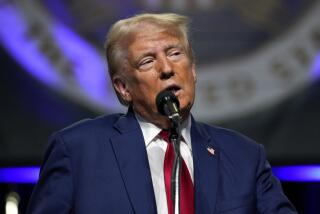Tillerson trims State Department staff and vows to make diplomacy more efficient
Reporting from WASHINGTON — Secretary of State Rex Tillerson is finishing what he calls a “redesign plan” that would shrink the State Department and revamp American diplomacy in ways that already have drawn bipartisan criticism on Capitol Hill.
Tillerson said he is determined to do more with less even as the Trump administration grapples with growing foreign policy challenges in North Korea, Syria and Russia.
“The most important thing I can do is to enable this organization to be more effective, more efficient,” Tillerson told U.S. Embassy employees in London on Thursday. “Because if I accomplish that, that will go on forever and you will create the State Department of the future.”
Since taking office, Tillerson has moved slowly to fill traditional leadership slots at State, leaving many offices vacant or nearly so. Retirements, removals, hiring freezes and fewer promotions have trimmed staff. A few diplomats have publicly quit to protest administration policy.
Among the most vulnerable have been diplomats at programs now out of favor, like climate change and women’s empowerment, as well as special envoys. Some special fields, such as religious freedom, are being subsumed in other bureaus.
Tillerson delivered a progress report on his redesign plan to the White House Office of Management and Budget on Tuesday. It quickly prompted a bipartisan protest.
“Smart investments in diplomacy and development can help accelerate economic growth, create opportunity, prevent the spread of infectious diseases, stabilize communities and mitigate the need for costly military interventions,” four members of Congress, two Democrats and two Republicans, wrote OMB Director Mick Mulvaney..
“Poor planning and execution can have the exact opposite effect,” they wrote.
Tillerson last month denied he is “hollowing out” the department. He said that reorganization will take months to implement and that some positions are best left unfilled until all the pieces are in place.
Congress already has pushed back hard on the staffing and budget cuts.
This year, Tillerson backed President Trump’s proposal to cut State’s budget from about $55 billion to about $39 billion. He told a Senate committee in June that he aimed to cut about 1,300 jobs — 327 foreign service officers and about 1,000 civil service employees.
State has about 13,000 foreign service employees and 11,000 civil service employees.
The Senate Appropriations Committee last week voted unanimously to approve a $50-billion budget, adding $11 billion to the administration’s request, warning that deeper reductions “serve only to weaken America’s standing in the world.”
Many diplomats concur with Tillerson’s call for greater efficiency at State, which often is described as bloated and eligible to streamlining.
But critics say Tillerson has cut too sharply. He has yet to name an assistant secretary for eastern Asia, for example, despite the crisis with North Korea. A lower-ranking special representative for North Korea policy is handling the portfolio instead.
“You have to put somebody of enough rank on a plane to Seoul, to Tokyo … to build a coalition,” said Daniel Fried, who retired in March after 40 years in the foreign service. “It can’t just be tweets and phone calls.”
The State Department “is not a corporation you can downsize at will,” Fried said. “I don’t think this is a plot by Tillerson to destroy diplomacy … but you need to have your people in place.”
In January, State had six career ambassadors, the highest rank. Today two are left, and one of them says he will retire next month. At the next level, only 13 of 20 career ministers remain.
Barbara Stephenson, former U.S. ambassador to Panama and current president of the American Foreign Service Assn., called the diplomatic service “the most cost-effective tool in the national security tool kit.”
“This is no time to pull the American foreign service team from the field and cede the game to our adversaries,” she said.
State Department rules require diplomats to receive promotions every seven years or they have to leave the foreign service.
This year’s promotion list, released just before Labor Day, was less than half last year’s size: 41 names, down from 96. New diplomats similarly are being hired at less than half last year’s rate.
The department’s job search program, which helps diplomats find new employment, fielded the largest class ever this year, officials said.
Conservative groups have argued that State has strayed from its core diplomatic mission and wastes money in aid for “trendy causes” like rights for gays and lesbians, empowerment of women and climate change.
“If you believe in diplomacy, cuts are a good first step,” Theodore Bromund wrote in a report for the conservative Heritage Foundation. State needs to be adequately funded, he wrote, “but it also needs a cultural change and to return to its core business of bilateral diplomacy.”
For more on international affairs, follow @TracyKWilkinson on Twitter
More to Read
Sign up for Essential California
The most important California stories and recommendations in your inbox every morning.
You may occasionally receive promotional content from the Los Angeles Times.











